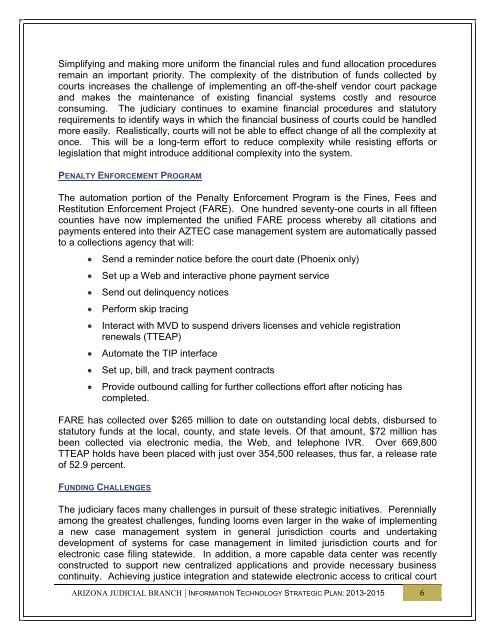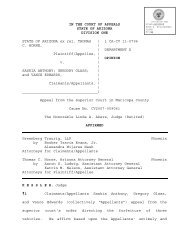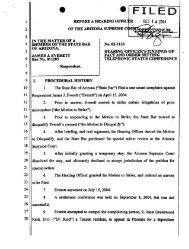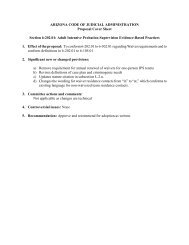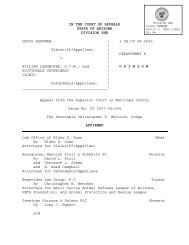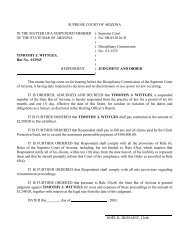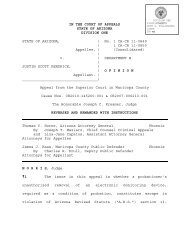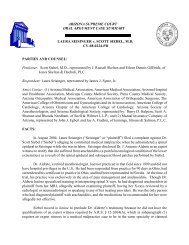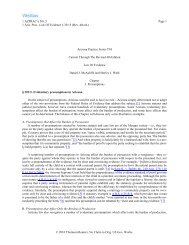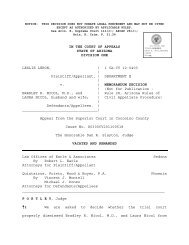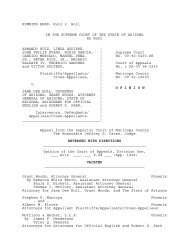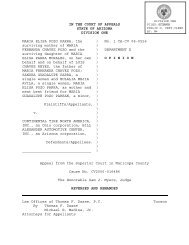Print Version - Arizona Judicial Department
Print Version - Arizona Judicial Department
Print Version - Arizona Judicial Department
You also want an ePaper? Increase the reach of your titles
YUMPU automatically turns print PDFs into web optimized ePapers that Google loves.
Simplifying and making more uniform the financial rules and fund allocation procedures<br />
remain an important priority. The complexity of the distribution of funds collected by<br />
courts increases the challenge of implementing an off-the-shelf vendor court package<br />
and makes the maintenance of existing financial systems costly and resource<br />
consuming. The judiciary continues to examine financial procedures and statutory<br />
requirements to identify ways in which the financial business of courts could be handled<br />
more easily. Realistically, courts will not be able to effect change of all the complexity at<br />
once. This will be a long-term effort to reduce complexity while resisting efforts or<br />
legislation that might introduce additional complexity into the system.<br />
PENALTY ENFORCEMENT PROGRAM<br />
The automation portion of the Penalty Enforcement Program is the Fines, Fees and<br />
Restitution Enforcement Project (FARE). One hundred seventy-one courts in all fifteen<br />
counties have now implemented the unified FARE process whereby all citations and<br />
payments entered into their AZTEC case management system are automatically passed<br />
to a collections agency that will:<br />
Send a reminder notice before the court date (Phoenix only)<br />
Set up a Web and interactive phone payment service<br />
Send out delinquency notices<br />
Perform skip tracing<br />
Interact with MVD to suspend drivers licenses and vehicle registration<br />
renewals (TTEAP)<br />
Automate the TIP interface<br />
Set up, bill, and track payment contracts<br />
Provide outbound calling for further collections effort after noticing has<br />
completed.<br />
FARE has collected over $265 million to date on outstanding local debts, disbursed to<br />
statutory funds at the local, county, and state levels. Of that amount, $72 million has<br />
been collected via electronic media, the Web, and telephone IVR. Over 669,800<br />
TTEAP holds have been placed with just over 354,500 releases, thus far, a release rate<br />
of 52.9 percent.<br />
FUNDING CHALLENGES<br />
The judiciary faces many challenges in pursuit of these strategic initiatives. Perennially<br />
among the greatest challenges, funding looms even larger in the wake of implementing<br />
a new case management system in general jurisdiction courts and undertaking<br />
development of systems for case management in limited jurisdiction courts and for<br />
electronic case filing statewide. In addition, a more capable data center was recently<br />
constructed to support new centralized applications and provide necessary business<br />
continuity. Achieving justice integration and statewide electronic access to critical court<br />
ARIZONA JUDICIAL BRANCH | INFORMATION TECHNOLOGY STRATEGIC PLAN: 2013-2015 6


